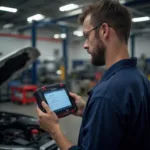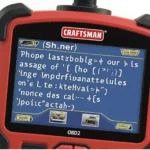Detecting an ECU tune through the OBD2 port can be tricky. This article will delve into various methods for how to detect an ECU tune obd2 port, covering everything from simple checks to more advanced techniques, providing you with a comprehensive understanding of this important topic. We’ll explore the signs, tools, and strategies you can use to identify whether a vehicle’s engine control unit (ECU) has been modified.
Is your car performing differently than usual? Perhaps it feels more powerful, or maybe the fuel economy has changed drastically. These could be indicators of an ECU tune. An ECU tune alters the parameters controlling the engine’s operation, often to enhance performance or fuel efficiency. Detecting these changes requires a careful approach, and we’ll guide you through the process. We’ll even explore some common scenarios and FAQs to equip you with the knowledge you need.
Understanding ECU Tuning and its Detection
ECU tuning involves modifying the software that governs engine performance. This can range from simple adjustments to fuel maps to more complex alterations affecting ignition timing, boost pressure (in turbocharged engines), and other critical parameters. Why would someone want to tune their ECU? Reasons include increasing horsepower and torque, improving fuel economy, or adjusting for aftermarket modifications like a new exhaust system.
Detecting an ECU tune, however, isn’t always straightforward. While some tunes are obvious, others can be subtle and difficult to identify. The complexity of modern ECUs means there isn’t a single foolproof method, but a combination of techniques can often reveal the truth.
After this introductory section, we encourage you to explore the detailed information about the obd2 serial interface available on our website. This will give you a deeper understanding of the communication protocol used for diagnostics and tuning.
Methods for Detecting an ECU Tune
There are several methods for detecting an ECU tune through the OBD2 port:
- Checking for DTCs (Diagnostic Trouble Codes): A poorly implemented tune might trigger DTCs related to emissions or engine performance. However, a well-executed tune can avoid setting off these codes, making this method unreliable on its own.
- Reading Live Data: Monitoring live data parameters like boost pressure, fuel trims, and ignition timing can reveal deviations from factory specifications, suggesting a potential tune. This requires some knowledge of the vehicle’s normal operating parameters.
- Comparing Checksum Values: The ECU’s software has a checksum value that acts as a fingerprint. Comparing this value to the factory checksum can reveal if the software has been altered. However, access to the factory checksum can be challenging.
- Using Specialized Software: Some OBD2 software packages are specifically designed to detect ECU tunes. These tools can compare the ECU’s software to a database of known tunes and identify potential modifications.
- Inspecting the OBD2 Port Itself: While not a definitive method, physical signs of tampering with the OBD2 port, such as scratches or loose connections, might indicate that someone has accessed the ECU for tuning purposes.
Advanced Techniques for ECU Tune Detection
Beyond the basic methods, more advanced techniques exist for detecting ECU tunes:
- ECU Flash Counter: Some ECUs keep track of how many times the software has been flashed or updated. A higher-than-expected flash counter can suggest an ECU tune.
- Memory Dumps: Analyzing a memory dump of the ECU’s software can reveal modifications that might not be detectable through other methods. This requires specialized tools and expertise.
If you’re facing issues with your Cobb Accessport, such as it not detecting the OBD2 port, check out our guide on “cobb will not detect obd2 to recover car.”
Common Scenarios and FAQs
Here are some common scenarios and frequently asked questions about detecting ECU tunes:
- Can I detect a tune with a generic OBD2 scanner? Basic scanners can reveal DTCs and live data, providing some clues, but they lack the advanced capabilities of specialized software.
- My car feels faster, but no DTCs are present. Is it tuned? It’s possible. A well-executed tune might not trigger DTCs. Further investigation using other methods is recommended.
- Can I hide an ECU tune? Some tuners offer “stealth” tunes designed to avoid detection, making it more challenging to identify modifications.
Conclusion
Detecting an ECU tune via the OBD2 port requires a combination of observation, knowledge, and the right tools. While basic methods can provide some clues, more advanced techniques offer greater certainty. By understanding the various methods and indicators, you can effectively determine whether a vehicle’s ECU has been modified. Knowing how to detect an ECU tune obd2 port empowers you to make informed decisions about vehicle maintenance and performance. For Android users, you can explore our recommended android obd2 cable for enhanced diagnostics.
FAQ
- What is the most reliable way to detect an ECU tune? Analyzing a memory dump of the ECU software is often the most reliable method.
- Can an ECU tune be reversed? Yes, in most cases, an ECU tune can be reversed by reflashing the ECU with the original factory software.
- Is it legal to tune an ECU? The legality of ECU tuning varies depending on local regulations and the intended use of the vehicle.
- Can an ECU tune damage my engine? A poorly implemented tune can potentially damage an engine. It’s crucial to use reputable tuners and quality software.
- Will an ECU tune void my warranty? Modifying the ECU can often void or affect the vehicle’s warranty.
- How much does an ECU tune cost? The cost of an ECU tune can vary significantly depending on the vehicle, the type of tune, and the tuner.
- Can I tune my own ECU? While possible with the right tools and knowledge, tuning your own ECU can be risky. It’s generally recommended to consult a professional tuner.
You can find more information on troubleshooting specific OBD2 codes, like the P0300 code for Toyota vehicles, in our article “obd2 p0300 toyota”. For information about using an OBD2 to USB tuning cable, check out “obd2 to usb tuning cable”.
For further assistance, don’t hesitate to contact us via WhatsApp: +1(641)206-8880, Email: [email protected] or visit our office at 789 Elm Street, San Francisco, CA 94102, USA. We offer 24/7 customer support.

